KTemoc Konsiders ........
A meeting place to exchange views, no matter how different or diverse these may be. Keeping these civil and courteous would be appreciated
Monday, May 05, 2025
Siti Kasim wants the Malays to stop being afraid of anything T-shaped, start respecting Christian cross
Siti Kasim wants the Malays to stop being afraid of anything T-shaped, start respecting Christian cross
OBSERVING that “Malays in the peninsula are getting more irrational”, Siti Kasim had chided her brethren for equating T-shaped designs, patters or objects to Christian crosses, hence beginning to develop phobic thoughts of sinister anti-Islam agenda being hatched.
Alluding to two incidents – the crucifix light of a high-rise in Penang (January 2019) and the resident protest by residents of Taman Medan in Petaling Jaya over the cross on a church building (April 2015) – the 62-year-old human rights activist and lawyer lamented:
“I myself can’t fathom as to why the Malays behave in such manner or why do they harbour such thoughts? Why are they so frightened about the Christian cross?
“During my school days in the Methodist Girls’ Secondary School Melaka, there was a big cross in our school hall yet my Malay peers and I never felt that our akidah (Muslim faith) is challenged by staring at the cross.”
Fast forward to the present, however, Siti Kasim is fascinated as to how the sight of the cross “can tempt one to become a Christian immediately”.
“Or this is only to show that the Malays are incapable of respecting the religion of others … Isn’t Christianity part of the Ahli Kitab (People of the Book)?” she asserted in her latest YouTube rant.
“Such mentality is worsening by the days … The irrationality is on the rise maybe due to social media influence. As for the Taman Medan incident, could they (protestors) being manipulated by certain political quarters for ordinary Malays are usually not bothered with such matters?”
In this regard, Siti Kasim urged the Malays to think of Muslim minority countries which they often regard as kafir (infidel) yet Muslims are treated with respect with them permitted to set up mosques or surau or even allowed to worship peacefully.
“What’s wrong then with Christians worshipping at churches? When then can’t you guys as Muslims respect people of others faith? … Instead, you cast fear as if you instantaneously become a Christian when you see anything T-shaped.”
At the end of the day, the Orang Asli advocate hopes that the relevant authorities are able “to teach the Malays to respect other religions so they don’t feel intimidated with the sight of T-shaped patterns or Christian cross”.
“This issue is getting serious and out of hand with misplaced protests when such protests should be directed at corrupt Malays or ustaz who sodomise religious school pupils.
I don’t know if they’re paid to stage a protest but what has the church done wrong to you? If you feel that your faith is easily threatened, then blame it on your shallow religious knowledge.
Don’t think that you want to control or bully others just because you’re in the majority. – May 4, 2025
Insider information claims Rafizi wants to resign following disastrous party polls
Focus MALAYSIA:
Insider information claims Rafizi wants to resign following disastrous party polls
DATUK Seri Mohd Rafizi Ramli, PKR Deputy President and Minister of Economy expressed his intention to resign during a meeting with supporters after a PKR Central Leadership Council meeting on April 23.
Quoting a loyal supporter, Sinchew Daily reported that Rafizi expressed his desire to resign due to dissatisfaction with the party’s election system, which he allegedly deemed unfair.
Although rumours suggested he vacated his office at the Ministry of Economy, a source denied this.
It is now known that Rafizi requested a one-month leave until May 31, which Prime Minister Datuk Seri Anwar Ibrahim described as routine.
The portal also said Rafizi proposed an external audit of the PKR election system to Anwar, with results expected in early May to clarify his future actions.
Several PKR branches have conducted re-elections, resulting in changes to the results for three branch chief positions, namely Selayang in Selangor, Jempol in Negeri Sembilan, and Pasir Salak in Perak.
Re-elections in several PKR branches led to changes in three branch chief positions, and MPP nomination dates were rescheduled to May 8-9. Anwar stated there were no issues with Rafizi’s leave.
Meanwhile, Rafizi also made a comeback on social media platforms yesterday. Instead of dealing with the PKR election drama, he hit at PAS.
In a May 3 Facebook post, Rafizi refuted opposition claims that the federal government marginalises opposition-led states like Kelantan in tax revenue distribution.
He dismissed PAS and PN’s allegations as recycled tactics to incite anti-government sentiment.
Rafizi highlighted their narrative, intensified by Pasir Putih MP Datuk Dr Nik Muhammad Zawawi Salleh’s demand for PAS to directly collect Kelantan’s taxes, which are currently managed federally.
He described these accusations as part of an effective campaign strategy to portray the federal government as sidelining opposition states in development fund allocations.
“PAS and Perikatan’s effective campaign tactic involves accusing the federal government of sidelining them, claiming taxes collected from opposition states aren’t returned as development funds,” Rafizi said.
The narrative escalated with the Pasir Putih MP demanding PAS be allowed to collect Kelantan’s taxes which are currently managed federally. —May 4, 2025
Main image: Malay Mail
Siti Kasim Slams Malays for Meddling in Others Affairs: Says Don't Embarrasses Malaysia

Siti Kasim Slams Malays for Meddling in Others Affairs: Says Don't Embarrasses Malaysia
4 May 2025 • 10:30 AM MYT
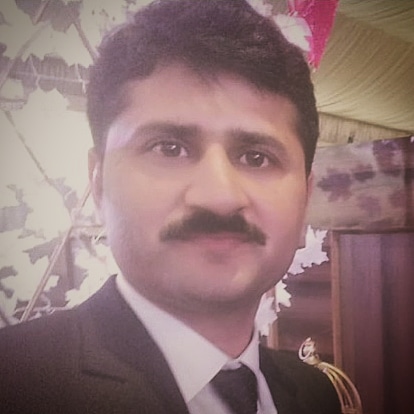
Kamran
A freelance content creator

Image Credit: Focus Malaysia
Prominent lawyer and human rights advocate Siti Kasim has voiced her outrage at Malays who, in her words, fail to "mind their own business" and instead make disparaging remarks about others, especially those with differing views or beliefs.
Her anger was sparked by recent online criticism targeting former Indonesian President Joko Widodo (Jokowi) and three special envoys who attended the Vatican funeral of the late Pope Francis. The criticism stemmed from the fact that they wore the songkok, a traditional cap often associated with Malay Muslims. A Malaysian content creator even accused Jokowi of reciting Al-Fatihah—a Muslim prayer—for the Pope, prompting widespread backlash.
Siti condemned this behavior, calling out the ignorance of netizens who rush to judge others without understanding cultural nuances. They think the songkok belongs exclusively to Muslims, she said in a recent YouTube video. But in Indonesia, Christians and Hindus may also wear it. That’s the problem with these busybodies—they tie a piece of clothing to religion without deeper thought.
She didn’t hold back in expressing her embarrassment over such behavior, particularly since it tarnishes Malaysia’s international image. She lamented that the ignorance and shallow religious knowledge are now on display for the whole world and it’s a disgrace that she has to partially bear because these people came from her own race.
Siti also pointed out the danger of such online actions, noting that even though some hide behind anonymous accounts, modern technology makes it easy to uncover real identities. “You’re dragging down the whole country because of your idiocy,” she warned.
Taking a broader swipe, she referenced past incidents involving Malaysian political figures who interfered in Singaporean affairs. Siti was particularly scathing toward two PAS leaders who encouraged Singaporean Malays to vote based on race and religion—an act that forced Singapore’s Prime Minister to respond diplomatically. Siti, however, didn’t hold back: “Let me say what he couldn’t—bugger off!”
Her central message was clear: stop interfering in matters that don’t concern you, especially when your own house isn’t in order. “Always ensure your own house is kempt before you start messing up the home of others … Start by ensuring that you bring up an intelligent family first before meddling in the business of others,” she said.
Siti Kasim’s remarks serve as a harsh but necessary reminder of the consequences of ignorance, prejudice, and online irresponsibility.
It’s Time to Go for MIER

Murray Hunter
It’s Time to Go for MIER
Ishak bin Ismail
May 04, 2025
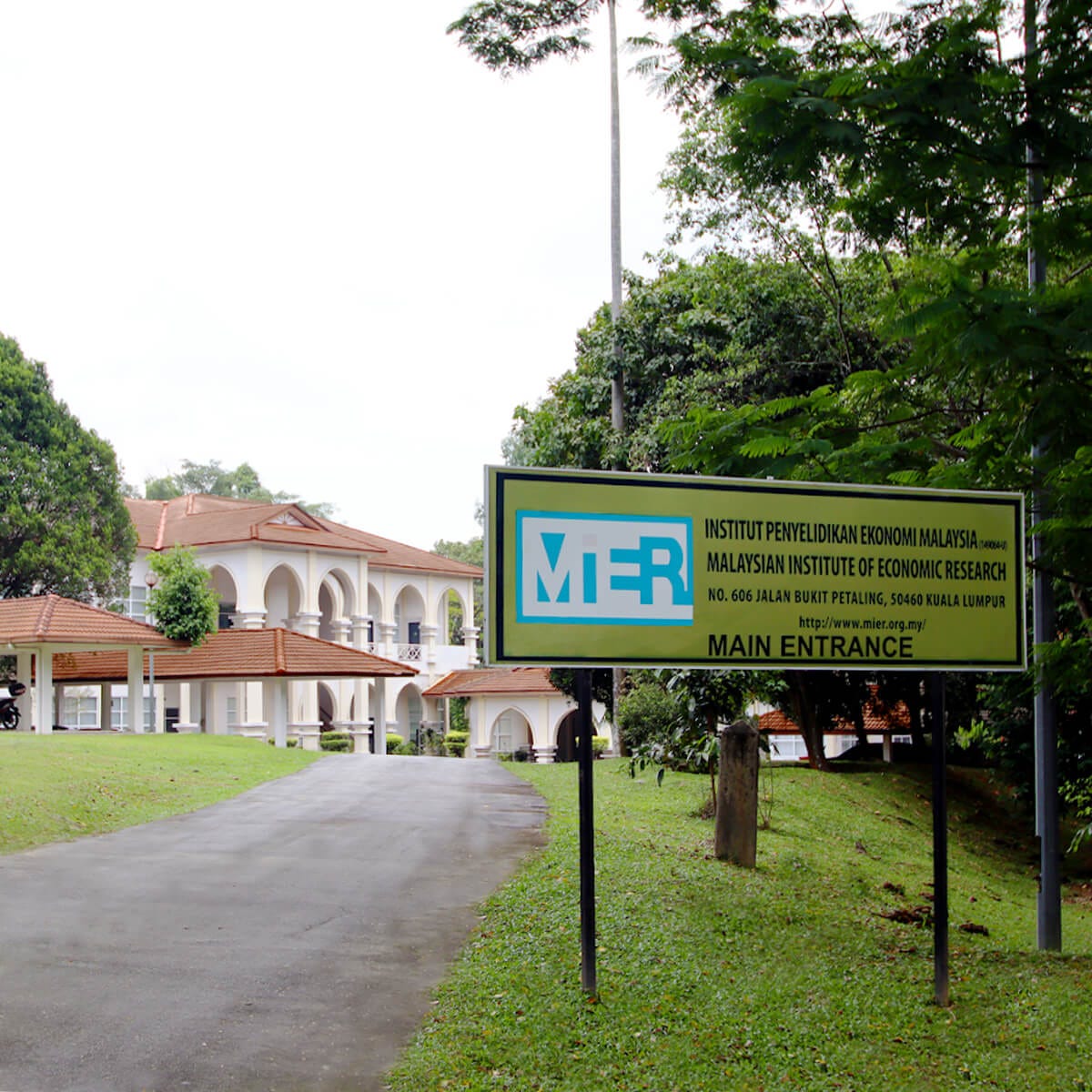
When Tan Sri Sulaiman Mahbob succeeded Tan Sri Sheriff Kassim as Chairman of the Malaysian Institute of Economic Research (MIER) more than a decade ago, he inherited far more than a title—he inherited an institution at its intellectual and financial zenith. Flush with over RM16 million in reserves, MIER served as a dynamic hub of economic thought and a powerful voice in the marketplace of ideas both at home and abroad.
This was not merely a prominent think tank—it was the think tank. Even His Majesty the now Sultan of Perak, Sultan Nazrin Shah, a man of letters and ideas, honoured the National Economic Outlook Conference (NEOC) with an address that was as forward-looking as it was erudite.
Behind that gravitas stood figures of substance: Sheriff Kassim, a former Secretary-General of the Ministry of Finance; Emeritus Professor Mohd Ariff Abdul Kareem of the University of Malaya, one of Malaysia’s most respected economic minds; and Lee Kim Bian, then Assistant Director, whose quiet competence kept the institute’s gears well-oiled and moving forward.
At its peak, MIER ranked among the Top 25 think tanks in Asia, according to the Global Go To Think Tank Index produced by the Think Tank and Civil Societies Program at the University of Pennsylvania under the late Dr. James McGann. That ranking was the global benchmark—and MIER belonged in that conversation.
Fast forward to today, and the narrative has shifted dramatically. Despite receiving millions in government funding over the years, MIER now bears little resemblance to its former self; it has become a mere echo of its past glory. Yet it continues to proclaim the government as both “client and benefactor,” even though every government representative has been removed from its Board of Trustees. In their place sit a succession of CEOs and executive directors whose expertise often seems ill-fitting for an economic research institution.
Building on this irony, MIER still occupies government-owned premises while outsourcing its technical work to foreign nationals—a curious decision for an organisation tasked with strengthening national capacity. The result is less a powerhouse of policy analysis and more a theatre of missteps and missed opportunities.
MIER has strayed from its core functions. It ventured into projects like the Third National Car initiative and has since abandoned economic forecasting and surveillance—two of its essential functions. Its diffusion indices for business confidence and consumer sentiment, once prized as barometers of economic health, have been discredited by multiple statistical reviews and independent analyses that show they frequently diverge from real-world data and sometimes move counter to broader economic trends. Their unreliability has eroded so severely that both Bank Negara Malaysia and the Monetary Authority of Singapore, institutions renowned for analytical rigour, are reported to have ceased using them.
More damning still is its latest annual report (SSM registration No. 149064-U), titled:
FINANCIAL STATEMENTS
FOR THE YEAR ENDED 31 DECEMBER 2023
“These Financial Statements and Reports of the Company with Unqualified Auditors’ Report for the financial year ended 31 December 2023 were tabled at the AGM held on 8 August 2024.”
Turn to page 7, however, and the real revelation appears under “Basis for Qualified Opinion”:
Basis for Qualified Opinion
“During the year, the Institute received financial assistance to conduct surveys and research on post COVID-19 impact and recovery to the Malaysian amounting RM2,500,000 from the Ministry of Finance (MOF). However, we were not provided with the report and other deliveries of the above surveys and research submitted to the MOF for us to ascertain whether the Institute had fulfilled all its performance obligations and accordingly can utilise this financial assistance as grant income for the financial year ended 31 December 2023.
Consequently, we were unable to determine whether any adjustments to these amounts were necessary.”
Against this backdrop, MIER’s decline feels less like a natural cycle and more like a betrayal of its own legacy. The institute that once set the standard for excellence in economic research has been allowed to drift—or worse, to be steered—into irrelevance.
And to the Ministry of Finance: it’s time to act with clarity and conviction—pull the plug on MIER once and for all. What remains is nothing more than an intellectual dud, its once-brilliant mind bank now bankrupt of ideas; a vagabond institution, wandering aimlessly from one ill-conceived project to the next; a loose cannon on the deck of Malaysia’s economic ship, threatening to scuttle our policy vessel with its erratic forecasts and misplaced priorities.
MIER has long outlived its relevance, having lost both its moral compass and its raison d’être. Let us consign this rogue, dysfunctional outfit to history and clear the stage for a new era of think-tank excellence—one grounded in integrity, rigour, and genuine service to the nation.
It’s time to end the farce once and for all—shut it down!
—————————————-
Ishak bin Ismail is an observer of Southeast Asian Affairs.
The Billionaires Around Trump

Murray Hunter
The Billionaires Around Trump – OpEd
May 04, 2025
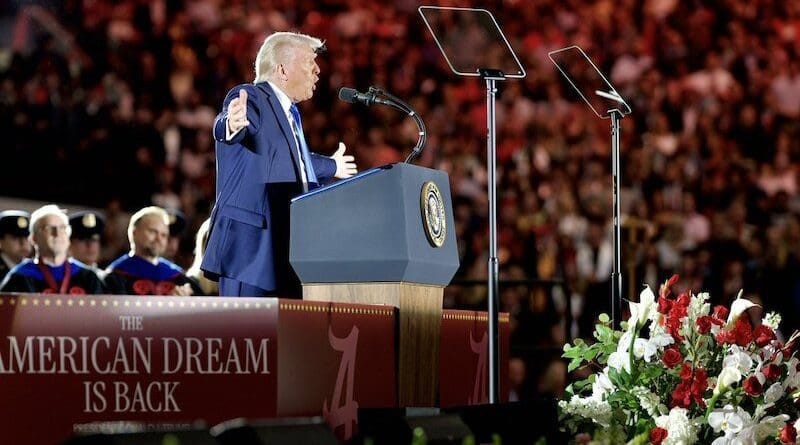
While US President Donald Trump continues to pursue his Make America Great Again (MAGA) ideologies, some are beginning to question the influence of the group of billionaires around him. Although Trump has pursued his nationalistic, protectionist, migration restriction winding back on globalism and imposition of tariffs, there are some who believe, some of what Trump has done (is doing) are for the benefit of those around him.
Credible or not, there are criticisms that Trump’s policies on Gaza, Iran, and bombing of Yemen are for the benefit of the Jewish lobby. The reduction on tariffs for mobile phones, microchips, notebooks are assisting tech-billionaires, and the whole tariff imposition saga enabled billionaires ‘in the know’ to profit from this policy decisions.
There is no doubt that the billionaires around Trump exercise some influence. Just how much is an unknown factor. Some will point to Miriam Adelson’s USD 100 million donation to the Trump presidential campaign as an example. Others add the influence from Elon Musk far outweighs his role in the Department of Government Efficiency or DOGE. There is no-doubt that Elon Musk who owns X played a major role in Trump’s win and preparation for the presidency.
The above are all issues to keep in view and continually assess while Trumps term continues. The purpose of the rest of this article is to identify the individuals both inside and outside Trump’s cabinet who can exercise potential influence on policy.
Elon Musk has been the most influential person on Trump until his inauguration. Musk’s role in the Department of Government Efficiency or DOGE had been instrumental in the beginning of Trump’s first month in office. Musk’s influence on Trump has run deep, but it will remain how long this relationship will continue. Musk donated more than USD 250 million to the Trump campaign after the attempted assassination on Trump in Butler Pennsylvania. Many pundits claim that Musk’s social media platform X played a major role in his election.
Miriam Adelson donated more than USD 100 million to the Trump campaign. Foreign policy pundits assert that Adelson’s influence has been very important on Trump’s Middle East policy, particularly advocating support for Israel. Trump moving the US embassy to Jerusalem, recognizing the Golan Heights as Israeli territory, airstrikes on the Houthis in Yemen and support for Israeli aggressiveness towards Iran are attributed to Adelson’s influence.
Other billionaires who have been attributed with some influence over Trump policies include hedge fund manager John Paulson in the area of tax cuts and economic reforms benefitting the wealthy, Bernie Marcus the Home Depot co-founder, Harold Hamm, oil industry, and Steve Wynn advocating for fossil fuel deregulation.
There were a large number of billionaire donors during Trump’s campaign, who are purported to have special access to the Trump administration, leading to criticisms of the Trump administration practicing ‘wealth-driven’ politics.
Former presidential candidate Vivek Ramaswamy, a biotech entrepreneur worth USD 1 billion was set to play a role with Elon Musk in DOGE, but is interested in running for Ohio governor in 2026. John Paulson, a USD 4 billion hedge fund manager who assisted in fund raising. Timothy Mellon, heir to the Mellon banking fortune and Trump’s largest donor in 2024, with USD 125 million. Steve Wynn, Nelson Peltz, and Marc Andreessen and Ben Horowitz, who switched from the Democrats to the Trump campaign. David Sacks, Jose (Pepe) Fanjul, Dianne Hendricks, Liz and Dick Uihlein, Woody Johnson, and Peter Thiel an early Trump supporter and ally of Vice President JD Vance, who is influential in Trump’s foreign policy. Isaac Perlmutter, Timothy Dunn, Stephen Schwarzman, and Bernard Arnault.
Most of these billionaires are aligned with the MAGA ideology and are purported to have special access to President Trump. This is criticised as policy skew by some Democrats, although a similar situation occurred in past democrat administrations.
Jeff Bezos, the Amazon founder who donated USD 1 million to the Trump campaign, has since put the costs of tariffs on his Amazon website in an attempt to damage Trump. Mark Zuckerberg also donated USD 1 million to the Trump campaign, seen more as being pragmatic, rather than becoming a Trump loyalist.
Cabinet and other senior government positions
Trump’s popularist government is actually made up of a cabinet with a number of billionaires.
Howard Lutnick is the secretary of commerce. Linda McMahon co-founder of World Wrestling Entertainment Inc. with her husband Vince McMahon is the secretary of education. Doug Burgum, a strong supporter of ‘fracking’ is secretary of the interior. Scott Bessent a hedge fund manager is treasury secretary. One must not forget Robert F Kennedy Jr, who is the secretary of health and human services. Although not a billionaire in his own right, he is supported by Nicole Shanahan, wife of Google founder Sergey Brin.
Other Trump administration agency positions include Jared Isaacman a NASA administrator, Steve Witkoff, as a special envoy to the Middle East and Russia, Warren Stephens as Ambassador designate to the United Kingdom, Kelly Loeffler As the administrator of the Small Business Administration, Steve Feinberg as deputy secretary of defense, and Tilman Fertitta as US ambassador to Italy and San Marino.
One must point out that Trump is very comfortable around many of the people above, and trusts some of them more than advisors from ‘within the establishment’. Its more likely that the billionaires around Trump will exercise more influence than many of the traditional think tanks that have been associated with ‘Washington’. Trump has created a circle of people who are ‘not from the swamp’, who mislead him during his first administration.
As time goes on, we will observe how compatible are the billionaires around Trump with the MAGA movement.
Originally published in Eurasia Review 2nd May 2025
Sunday, May 04, 2025
The Myths And Realities Of The Thai Deep South – Analysis

Murray Hunter
The Myths And Realities Of The Thai Deep South – Analysis
May 03, 2025

Over the last 22 years, the Thai Deep South has been subjected to a violent insurgency, where more than 7,000 people have been killed as a consequence. The current insurgency is based upon claims going back hundreds of years over the sovereignty of Greater Pattani, which has now been broken up into three provinces Patani, Yala, and Narathiwat in Southern Thailand.
The insurgency flared up in 2003 by a number of separatist insurgency groups of which the Barisan Revolusi Nasional (BRN) claims to be the major group.
The Deep South is a very heterogeneous region in the south-eastern part of Thailand, where ethnic Thais are a minority group. According to academics, the insurgency flared up over economic and cultural issues. The Thai government for many years pushed a policy of ‘Thainess’ in the region, where symbols such as government offices, temples, schools, civil servants, and monks became targets by insurgents. Over the years, there have been a number of assassinations of police, military personnel, civil servants and monks. Roads and trainlines are often laced with bombs in an attempt to disrupt transportation. Symbols of ‘Thainess’ are sometimes attacked and damaged out of pushback on the Thai state.
The government has responded by putting some 75,000 military and para-military personnel on the ground. These personnel are visible to the public and the inconveniences causes often lead to public frustration. The military find it very difficult to fight an enemy, which is both informal and only grouped together for specific planned operations, where it then disappears back into communities.
There have been a number of incidents which angered public sentiment, creating martyrs out of the insurgents. The Tak Bai massacre occurred on 25th October 2004, when the army piled suspected terrorists on trucks, resulting in 85 deaths from suffocation. Then in October 2007, 105 insurgents died in a shoot-out with Thai military that surrounded the Krue Se Mosque in Patani. The Krue Se Mosque with the battle scars still remaining has become a de facto-shrine of remembrance of the ‘struggle for Patani’, attracting many visitors on a daily basis.
Many myths have grown around the Thai Deep South insurgency. Many of these enhanced by journalists, who don’t live in the area itself. The rest of this article will look at these myths, and offer alternative narratives that may better reflect the realities.
1. The Deep South is stricken in poverty
Many analysts of the Deep South have cited ‘poverty’ is widespread across the region. If one mistakes communities preferring to live traditionally as farmers and fishermen, it might be easy to make such conclusions. Its very difficult to measure wealth and wellbeing using monetary measurements.
The rise in demand for durians has transformed many rural parts of the region over the last decade. There has been a surge in SME development, where nascent entrepreneurship is at all time highs. The towns have vibrant nightlife, with an exponential leap in places to eat and drink.
There appears to be little concern amongst most urban and rural MSME proprietors for the ideological issues of the insurgency.
2. Many civic leaders in the Deep South are Muslims
The population of the Deep South is represented by a large number of civic leaders in local, regional, and provincial governments. The speaker in the Thai Parliament Wan Muhamad Noor Matha is a native from Yala Province. The governor of Pattani Province Pateemoh Sadeeyamu, is a native of Yala and a Muslim. As the Deep South is a majority Muslim region most candidates for local elections are Muslims.
To a large extent, government of the Deep South is controlled by Muslims. Local and provincial government in Thailand has a large list of responsibilities of government and management affecting the population. This can now be seen in the symbols on local government infrastructure. In essence, Muslims in the Deep South are governed by Muslims.
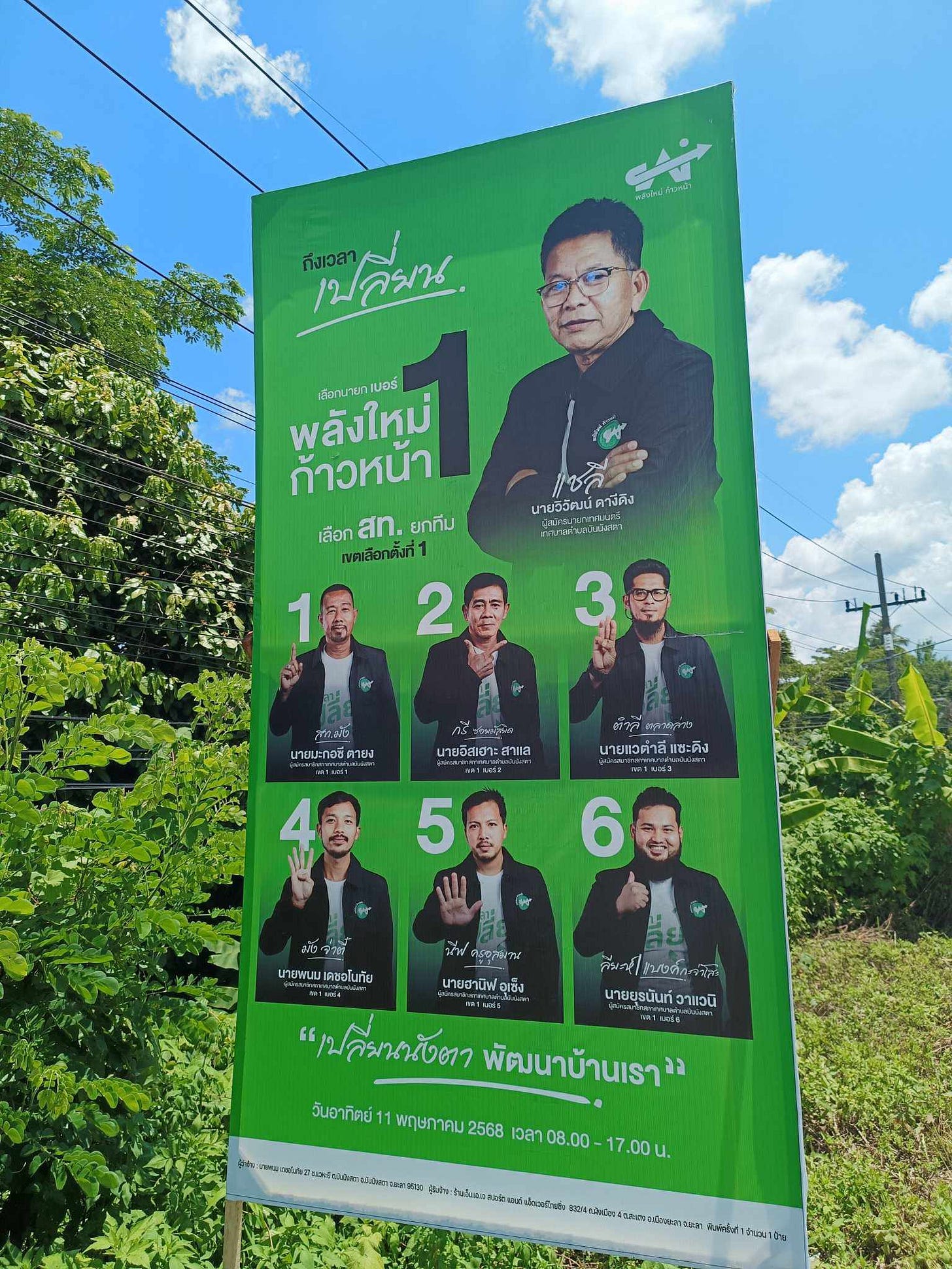
In contrast, separatist groups don’t represent the views of the majority of the people of the Deep South. This undermines the legitimacy of these groups, as the support base is small. The extent of sympathies the local population has for these separatist groups has never been measured. This is made even more complex, as different separatist groups hold different doctrines, ideologies, and engagement with the communities around them. In Narathiwat, some youth is attracted towards BRN-C for the group’s Salafi leaning. Many locals are alienated by the violence of these groups. Many empathise with activists like Soraya Jamjuree, who advocates peace and inclusion, which may better reflect the sentiments of the people.
3. Neither BRN or PULO directly control insurgents on the ground
Another myth is that Mara Patani (Majlis Syura Patani) and the Barisan Revolusi Nasional (BRN) actually control insurgents at the grassroots level. Insurgency cells today within the Deep South are informal, fluid, spasmodic in their operations, and act primarily unilaterally and in isolation. Most of these cells don’t communicate with each other or take orders from higher authorities.
The Thai government is negotiating with MARA Patani, which is made up of representatives very far away from the grassroots. Its difficult to see how MARA Patani could consult with and hold the views of various insurgency cells in the region, yet be able to control and direct them.
4. MARA Patani is unable to ‘do any deal’ that would bring an end to the insurgency
Many articles and reports on the Deep South place great weight on the nature and progress of negotiations between the umbrella group and the Thai government, with Malaysian mediation. The Thai government is talking to a group which cannot make any decisions. After a decade of negotiations not even a TOR (Terms of Reference) for the discussions has been agreed upon.
As of late, the government carried out some ‘secret’ discussions with a BRN group, but this group also cannot speak on behalf of insurgents on the ground.
These discussions have proved time and time again that they lead nowhere. On the government side, negotiators are regularly changed with different strategies. Often positive announcements are made to garner public favour and the appearance of progress.
Absent in the negotiations are members of the community of the Deep South itself, who are important stake holders. There are no community inputs into the issue in this ‘continual peace process’. Some longtime observers say that no one within the peace process actually wants a solution.
Any solution to the Deep South insurgency will only come from the people of the region themselves. Outsiders to date have too many ‘agendas’, which are not helpful.
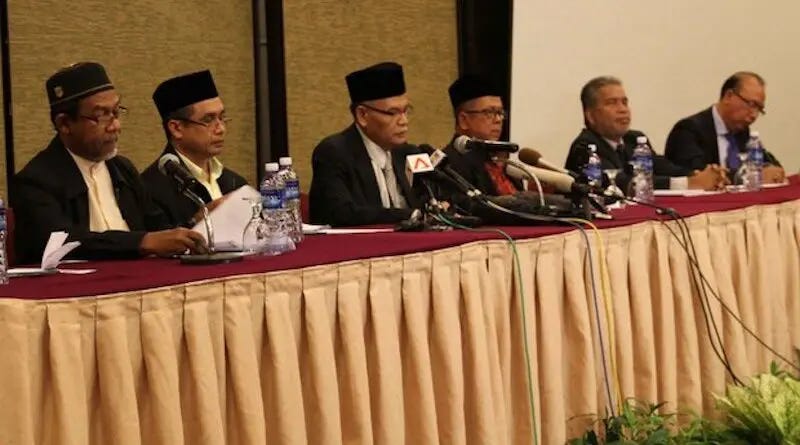
File photo of members of MARA Patani, an umbrella group representing various southern Thai rebel groups in negotiations with Thailand. Photo Credit: Benar News
There are many views about the role the military has played in the Deep South insurgency. Some claim the military has been a hinderance and put many locals offside in some for their programs, including the forced taking of genetic body material for bio-identity systems. On the whole, the military has not made the area safe, and used the wrong tactics and equipment to approach the whole problem. As such, some claim the whole military exercise has been aimed at gaining maximum budget allocations from the government.
The military has taken land and built small forts through out the region. Such structures have accomplished nothing. The very presence of the military within the region, according to some, is that it has inflamed the situation and led to more acts of violence by the insurgents.
6. The Muslims of the Deep South don’t identify as Malays
The concept of a ‘Malay’ is an orientalist concept brought in by the British during their occupation of the Tanah Melayu (the Malay peninsula). Malays in the peninsula are made up of many migratory groups, which include Javanese, Batak, Minang Kabau, Bugis, Banjarese, and other Riau groups.
The Muslims of Patani have a very long history on their land, where they see themselves as Orang Patani, or Patani people. The Sultanate of Patani goes back to 1350, derived from an older Hindu-Buddhist Langkasuka going back to the second century. Their identity is unique, where very few are willing to move away from their place of birth. This is still true today.
The Deep South has a powerful kinship, where Thais, Chinese, and those from Indian and Arab ancestry lived in co-existence for centuries. Today, new influences of Salafism are taking hold in the region, alongside a strong entrepreneurial culture.
Most people in the region today see themselves as Patani-Thais and are proud of this identity. Being both Khun Thai (Thai citizen) and Orang Patani have no contradictions or sense of identity stress.
The progression into the future will most likely be a continuance of the current status quo. The insurgency is transforming from a cultural one, towards a religious one, as the new generation infiltrates the insurgency groups.
Rafizi Ramli at a crossroads: Succession struggles and future of PKR

Murray Hunter
Rafizi Ramli at a crossroads: Succession struggles and future of PKR
P Ramasamy
May 04, 2025
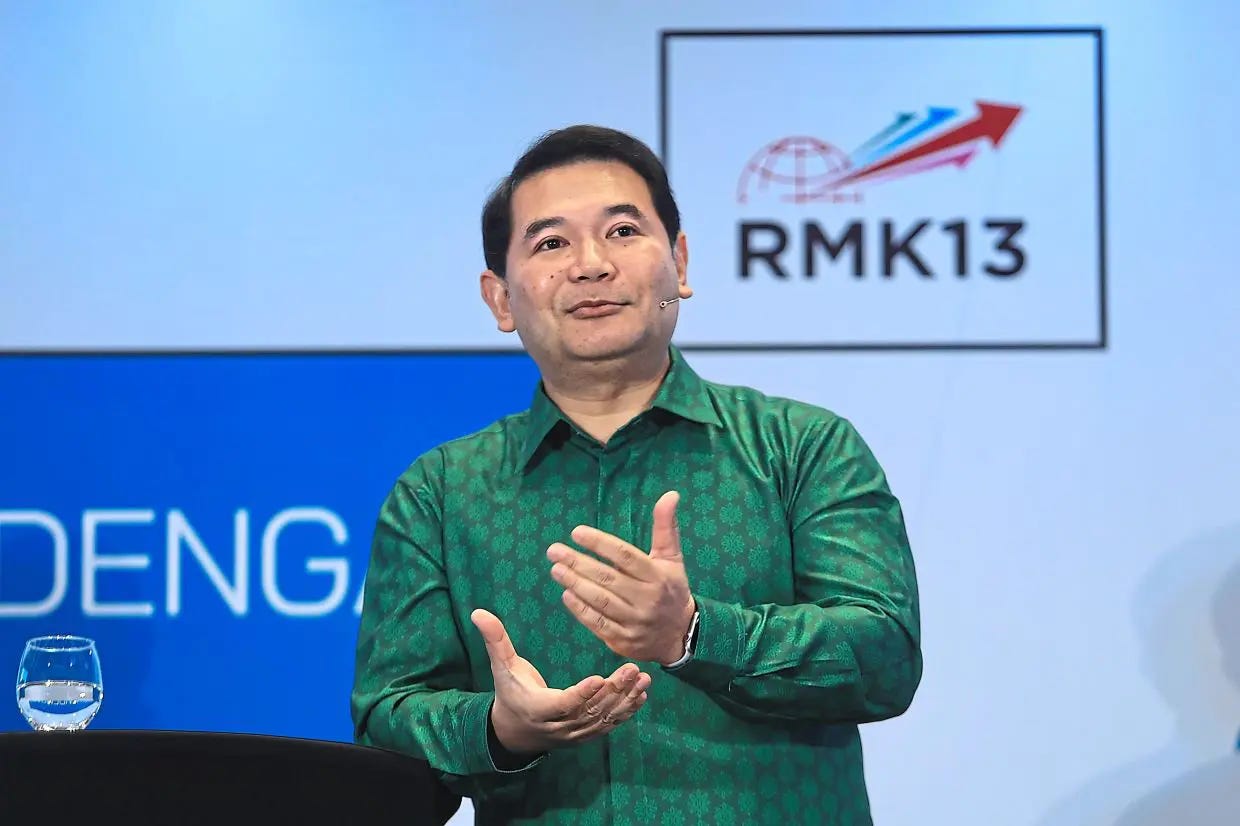
Rumours are circulating within political circles that PKR Deputy President Mohd. Rafizi Ramli may be on the verge of resigning from the party. According to reliable sources, Rafizi recently met with his close supporters and hinted at the possibility of stepping down—an apparent response to the outcome of the recent party elections, where many of his allies were edged out of leadership positions.
While Prime Minister Anwar Ibrahim, who is also the party president, has dismissed such speculation by claiming that Rafizi is merely “on leave”—something he described as routine—party insiders believe deeper tensions are at play.
Rafizi is expected to make a public announcement regarding his future in late May, once he returns from his break. But the underlying issues run far deeper than just the internal elections.
At the heart of the matter lies a brewing succession struggle within PKR. Under the party’s hierarchy, Rafizi, as deputy president, is widely perceived as the natural successor to Anwar. However, it has long been speculated that Anwar has other plans. Whether he is grooming his daughter Nurul Izzah or another loyalist remains unclear, but what is increasingly evident is that Rafizi is not Anwar’s preferred successor.
Anwar may still have ambitions to serve another term as Prime Minister, and he appears intent on sidelining Rafizi in the process. This marginalisation can be seen in the federal cabinet appointments. Although Rafizi was named Minister of Economy, the portfolio lacks real influence, with major economic policies still directed by the Ministry of Finance and other agencies.
Rafizi’s appointment to a relatively toothless ministry was a symbolic gesture—an attempt by Anwar to placate his deputy without granting him real power. A more suitable role, such as the Minister of Home Affairs, would have reflected Rafizi’s seniority and support within the party. Instead, that key post was handed to Saifuddin Nasution, a known loyalist who failed to even win a parliamentary seat.
Unlike Saifuddin, Rafizi has strong grassroots backing and is viewed by many as a forward-thinking, principled leader. Yet his increasing marginalisation seems deliberate—a move to prevent him from becoming a serious contender for the party presidency. In a twist of historical irony, Anwar may now be repeating the very strategy once used against him by Tun Dr Mahathir Mohamad.
Ideologically, Rafizi’s vision for PKR differs significantly from the current leadership. He seeks to steer the party toward a genuinely multi-racial and reform-oriented direction. However, this inclusive approach appears to be losing favour among those around Anwar, who seem more inclined to reshape PKR into a mono-ethnic party, akin to UMNO, PAS, or Bersatu.
This shift in party direction raises broader concerns about the future of political reform in Malaysia. If Rafizi is sidelined or pushed out, it would mark a retreat from PKR’s original multi-racial ethos and a betrayal of the progressive ideals many Malaysians hoped Anwar’s administration would uphold.
It is therefore imperative for party members and supporters committed to reform and multi-racialism to rally behind Rafizi. His presence in PKR represents the party’s best hope of resisting a regressive transformation and of keeping alive the vision of a truly inclusive Malaysia.
Core Trump

Consortium News
Volume 30, Number 123 —Sunday, May 4, 2025
Core Trump
“For the U.S. president, the truth has no claim” — Michael Brenner scrutinizes the effects of Trump’s behavior on foreign policy over the past 100-plus days

President Donald Trump during his commencement address an the University of Alabama in Tuscaloosa on May 1. (White House / Daniel Torok)
By Michael Brenner
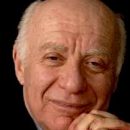
His contrived scheme designed to skirt the core issues and interests at stake was a non-starter from Day One. That should have been obvious. There was no serious thinking in the White House that might produce a coherent diplomatic strategy.
There manifestly was no understanding of Moscow’s position rooted in post-Cold War history and events since the U.S.-sponsored Maidan coup in 2014 — nor of the intransigence among the ultra-nationalists who pull Ukrainian President Volodymyr Zelensky’s strings.
Instead, what we got was vintage Trump. An impulsive reaching for a quick triumph to punctuate his brilliance as a statesman. The fixing of an objective without a thought-out plan how to achieve it.
A reliance on bullying, intimidation and underhanded dealing — the hallmark of his entire career; its apparent successes rooted in corruption, cronyism, and criminality — facilitated by the deference of other parties who lacked his ruthless cold-bloodedness. In his record of failures, as testified by six bankruptcies, he contrived to stiff his partners and creditors in each instance.
Against this background, his ability to cast himself as a winner owes more to the perversity of contemporary American society that invites chicanery than to any genius on his part.
On Ukraine/Russia Trump was grandstanding. There is an element of self-promotion in everything that he does publicly. The idea of being celebrated as a great peacemaker captured his imagination — not because he had any concern about the destruction and human cost or Europe’s long-term stability.
Admittedly, he also seemed to have been sold on the fashionable notion that the U.S. should mute its confrontation with Russia so as to be in a position to concentrate all our resources for the titanic struggle with China. The role of warrior-in-chief potentially could be just as appealing as that of peacemaker.
“His ability to cast himself as a winner owes more to the chicanery of contemporary American society than to any genius on his part.”
In fact, he had it both ways for a while: a Nobel Prize candidate for mediating in Ukraine; laurels from Israel’s American legions for reinforcing Washington’s complicity in the Palestinian genocide. What counts for Trump is the limelight and the exaltation.
So, he fixates on the one step that could stop the Ukraine fighting quickly — a ceasefire. None of the necessary and suitable preconditions exist; it amounts to calling a timeout of indeterminate length in a war that the other side is winning.
Yet, for three months that is the centerpiece around which everything pivots — futile proposals hatched by Trump’s virally anti-Russian advisers that only a fantasist images could lead to a settlement of the conflict.
The package presented to the Kremlin on a take-it-or-leave-it basis included such zany ideas as the U.S. taking over the critical Zaporizhzhia nuclear power station now under Russian control. This from a government that relentlessly for the past decade has pulled out all stops in its campaign to isolate and undermine the Russian state.
Tariffs & the Magical Circle

Trump being interviewed by Terry Moran from ABC News in the Oval Office on April 29. (White House / Joyce N. Boghosian)
So, the great tariff offensive is mired in its contradictions. Donald Trump’s hare-brained scheme to make the American economy great again is to force everybody else to pay extravagantly for the privilege of sending trillions in goods to the United States in return for nothing more than electronic banknotes printed by the Federal Reserve in the form of debt securities — securities they found it expedient to place in American financial institutions.
A magical circle has allowed Washington to run huge budget deficits and balance-of-trade deficits for decades without fear of a monetary comeuppance. It was the dollar’s supremacy in the global economy, American control of multilateral institutions like the IMF, and its leveraging of security protections that made this convenient arrangement possible.
However, that world no longer exists — a cardinal fact of contemporary international life beyond the comprehension of the hucksters who convinced Trump that this snake oil was the elixir that could cure the national economy of all that ails it — arresting the fading of American economic dominance and, indeed, ensuring its providential hegemony forever and anon.
An essential truth that we have been willfully overlooking is that Trump is an ignoramus — literally. His pool of knowledge about issues, places or persons is so shallow that you couldn’t drown a gnat in it. He doesn’t read. He thinks in slogans, as well as speaks in slogans.
The wide gaps between his declarations and the truth are at once the result of mental laxness and a characteristic of a clinical narcissist whose exalted sense of self can only survive by erasing the line between actuality and what he finds is comfortable and self-serving. Thus, for Trump the truth has no claim.
“His pool of knowledge about issues, places or persons is so shallow that you couldn’t drown a gnat in it.”
We have had nine years of the Trump phenomenon to observe how that approach to the world expresses itself. If further evidence were needed, scrutinize his behavior of the past 100+ days.
His understanding of the Russian leadership’s state of mind (and that of an overwhelming majority of citizens) is close to zero — despite repeated, candid statements by Russian President Vladimir Putin and his foreign minister, Sergei Lavrov, explaining with exceptional clarity what their views are.
The only notions Trump held were simplistic and mistaken: Putin is a strong leader and a hard-nosed wheeler-dealer of the type I’ve known all my life, someone with whom I can strike a deal; Russia is struggling to keep up the war effort; a few territorial concessions are all that is needed to resolve the dispute.
Similarly, his understanding of how the global economy works is equally impoverished. Macro-economics is not his thing; after all, he imagines that he became a (nominal) billionaire by being a master of micro finance. Does he even comprehend that supply chains are the connective issue of today’s international economy?
Safeguarding His Own Impulses

Trump with U.S. Defense Secretary Pete Hegseth during a Cabinet meeting on April 30. (White House / Molly Riley)
There is another feature of the malignant narcissist that is noteworthy: a powerful drive toward controlling what filters into his mind/feelings. Empathetic understanding of other parties, or detailed knowledge of complicated matters, is perceived as a potential threat to the uninhibited assertion of will. For it is constraining to recognize boundaries, the likely responses of interlocutors, second-order effects, or intricate intersections.
The imperative is to safeguard the privilege of saying or doing whatever that avaricious, demanding psyche may impulsively want to do at any given moment. Sudden reversals are the inevitable outcome.
One day we are told that the U.S. will abandon Ukraine to its fate unless it obeys Washington; next come an announcement with great fanfare of an historic joint-resource venture that will entail a massive American presence and stake in Ukraine’s future — such as it might be, an incidental oversight by Trumpian strategists.
“The imperative is to safeguard the privilege of saying or doing whatever that avaricious, demanding psyche may impulsively want to do at any given moment.”
For the same reason, the formal obligation to observe institutional rules (e.g. NATO, IMF), treaty stipulations, or alliance commitments is anathema.
Is this an overstatement of Trump’s ignorance? Let us recall that this is the president who advised Americans that they may protect themselves against the Covid-19 virus by injecting themselves with bleach. He’s also a president who appoints as secretary of health and human services a whacko who seems skeptical of the germ-theory of medicine.
So, Donald Trump is repositioning his foreign-policy people. National Security Advisor Mike Waltz is exiled to the United Nations. Secretary of State Marco Rubio becomes interim national security adviser – warming the seat until Steven Witkoff has completed his failed special-envoy missions in Moscow and the Middle East and available to take over.
In a normal government, led by a normal person, such a move so early in an administration would be seen as having considerable practical significance. It might reflect the outcome of a dispute fueled by serious policy differences. It might impend important changes in the structure and process of decision-making. Neither is likely in this instance.
There is no organized process for setting foreign-policy objectives, for choosing among strategies, for formulating the appropriate diplomacy. Structured, orderly deliberation is absent and alien. Decisions are made by Trump on an ad hoc basis. He listens at random to advice from the principal officeholders, from his White House entourage, from golf pals, from FOX TV personalities. From whomever.
The appointment of the hapless numbskull Pete Hegseth to head the Pentagon happened because Trump relished the crude inanities that he uttered at FOX. (During Trump’s first term, he habitually chatted late in the night with Sean Hannity about what the latter had broadcast in that evening’s segment).
Whatever impresses him he adopts — even if the ideas are contradictory or ephemeral. Hence, the changeability of what he tweets or says from day-to-day — re. Zelensky, Putin, Ukraine in or out of NATO, grabbing Greenland/Panama/Canada, trade negotiations with China versus new sanctions, negotiations with Iran vs Trump fatwa forbidding anyone in the world from buying its oil. All of this is transparent and repetitious. Yet, elided by the media and most commentators.
Frankly, there is a case to be made that the psychology of Trump’s unhinged behavior is less of an analytical challenge than is the behavior of all those analysts who insist on normalizing it by ascribing to Trump’s words and actions design and coherent strategy that simply do not exist.
Michael Brenner is a professor of international affairs at the University of Pittsburgh, mbren@pitt.edu
Pamela Ling suspected abduction: family, MACC officers among 12 to give statement


Pamela Ling suspected abduction: family, MACC officers among 12 to give statement
KL police chief says currently no leads or developments on her location yet
Scoop Reporters
Updated 4 hours ago
4 May, 2025
2:29 PM MYT
KUALA LUMPUR – 12 witnesses, including family members, have given their statements to the police over the disappearance of Pamela Ling Yueh, who is believed to be a victim of abduction.
Pamela was on her way to the Malaysian Anti-Corruption Commission (MACC) office in Putrajaya on April 9 before she lost contact with family members.
Kuala Lumpur police chief Datuk Rusdi Mohd Isa said those interviewed also included MACC officers and her lawyer.
“So far, there are no leads or developments regarding her whereabouts,” he told Bernama.
Pamela’s brother Simon Ling Wan Siong said Pamela had sent a WhatsApp message to her lawyer at 1.57pm to inform that she was en route to the MACC office and expected to arrive at 2.08pm via an e-hailing service.
Despite efforts by her family and lawyer to contact her after 2pm, phone calls went unanswered, and WhatsApp messages went undelivered.
The 42-year-old was making her way to the MACC office to give her statement regarding an ongoing investigation. Police received a report on her disappearance at 3.02pm on the same day.
The e-hailing company has also confirmed that the ride was completed, but no further information has been obtained.
Rusdi had earlier said that no ransom had been demanded, which is being investigated under Section 365 of the Penal Code for abduction.
Members of the public with any information are urged to contact Simon at 012-8866799 or the victim’s father, Ling Kie Yii, at 012-8867979. – May 4, 2025
Jewels linked to Buddha remains go to auction, sparking ethical debate
BBC:
Jewels linked to Buddha remains go to auction, sparking ethical debate
Soutik Biswas
India correspondent•@soutikBBC

The jewels comprise nearly 1,800 pearls, rubies, sapphires, and patterned gold sheets
On Wednesday, a cache of dazzling jewels linked to the Buddha's mortal remains, which have been hailed as one of the most astonishing archaeological finds of the modern era, will go under the hammer at Sotheby's in Hong Kong.
For over a century these relics, unearthed from a dusty mound in northern India in 1898, have sat largely unseen, cradled by a private British collection.
Now, as the gems prepare to leave the custody of their keepers, they are stirring not just collectors' appetites but also some unease.
They come from a glittering hoard of nearly 1,800 pearls, rubies, topaz, sapphires, and patterned gold sheets, first glimpsed deep inside a brick chamber in present-day Uttar Pradesh in India, near the Buddha's birthplace.
Their discovery – alongside bone fragments identified by an inscribed urn as belonging to the Buddha himself – reverberated through the world of archaeology. Nicolas Chow, chairman of Sotheby's Asia and worldwide head of Asian Art, believes this is "among the most extraordinary archaeological discoveries of all time".
Yet as these relics now face the glare of the auction room, experts tell the BBC that a question hangs heavy: can the sale of treasures so intimately woven into India's sacred past be considered ethical?
Advertisement
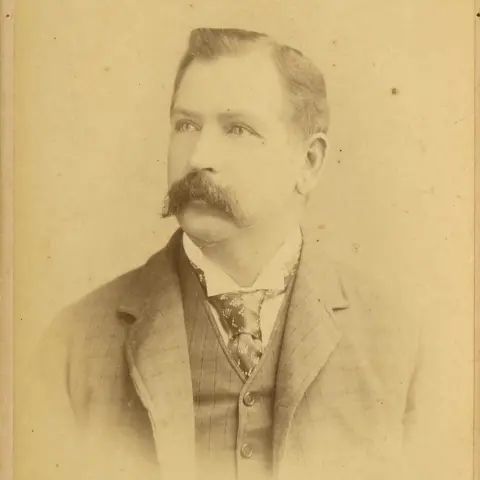
Courtesy Peppé family
William Claxton Peppé, an English estate manager, excavated the stupa and found the jewels
In 1898, William Claxton Peppé, an English estate manager, excavated a stupa at Piprahwa, just south of Lumbini, where the Buddha is believed to have been born. He uncovered relics inscribed and consecrated nearly 2,000 years ago.
Historians agree these relics, intact until then, are the heritage of both the Buddha's Sakya clan descendants and Buddhists worldwide. The bone relics have since been distributed to countries such as Thailand, Sri Lanka and Myanmar, where they continue to be venerated.
"Are the relics of the Buddha a commodity that can be treated like a work of art to be sold on the market?" wonders Naman Ahuja, a Delhi-based art historian. "And since they aren't, how is the seller ethically authorised to auction them?
"Since the seller is termed the 'custodian', I would like to ask – custodian on whose behalf? Does custodianship permit them now to sell these relics?"
Chris Peppé, great-grandson of William, told the BBC the family looked into donating the relics, but all options presented problems and an auction seemed the "fairest and most transparent way to transfer these relics to Buddhists".
Julian King, Sotheby's international specialist and head of sale, Himalayan Art, New York told the BBC the auction house had made a thorough review of the jewels.
"As is the case with any important items and collectibles that are offered for sale at Sotheby's, we conducted requisite due diligence, including in relation to authenticity and provenance, legality and other considerations in line with our policies and industry standards for artworks and treasures," King said.
Ashley Thompson, of Soas University of London, and curator Conan Cheong, both experts in Southeast Asian art, have more questions. In a joint statement they told the BBC: "Other ethical questions raised by the sale are: should human remains be traded? And who gets to decide what are human remains or not? For many Buddhist practitioners around the world, the gems on sale are part and parcel of the bones and ash."
The sale of the relics has also sparked concern among Buddhist leaders.
"The Buddha teaches us not to take other people's possessions without permission," Amal Abeyawardene of London-based British MahaBodhi Society, told the BBC. "Historical records indicate that the Sakyamuni clan were granted custody of these relics, as the Buddha emanated from their community. Their wish was for these relics to be preserved alongside adornments, such as these gems, so that they may be venerated in perpetuity by the Buddha's followers."
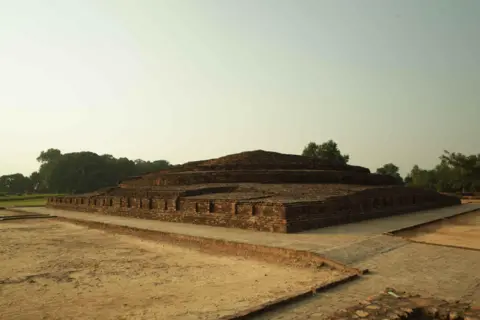
The jewels were unearthed from this stupa in Piprahwa, northern India in 1898
Chris Peppé has written that the jewels passed from his great-uncle to his cousin, and in 2013 came to him and two other cousins. That's when he began researching their discovery by his great-grandfather.
The Los Angeles-based television director and film editor wrote he had found 1898 newspaper reports - from Reuters to the New York Tribune - announcing the find of Buddha's remains.
"The colonisation of India by the British had been a source of some cultural shame for me [and continues to be] but, amidst the treasure hunters who hauled their finds back to England, there had also been people focused on the pursuit of knowledge," Chris Peppé writes.
He noted his research revealed a lot about his ancestors who he had dismissed as "prejudiced Victorians from a bygone era".
"I learned that Willie Peppé's first wife chose to travel around India for her honeymoon and loved the country and its culture. Sadly, she died from an unspecified illness. I learned that my grandmother was outraged at the land laws that applied to Indian women.
"And I learned that the excavation of the stupa was an attempt by Willie Peppé to provide work for his tenant farmers who had fallen victim to the famine of 1897."

The jewels are considered among the most extraordinary archaeological finds of all time
He writes his great-grandfather's "technical diagrams of ramps and pulleys suggest that he was also a trained engineer who couldn't resist a project".
William Peppé handed the gems, relics and reliquaries to the colonial Indian government: the bone relics went to the Buddhist King of Siam (Rama V). Five relic urns, a stone chest and most other relics were sent to the Indian Museum in Kolkata - then the Imperial Museum of Calcutta.
Only a small "portion of duplicates", which he was allowed to keep, remained in the Peppé family, he notes. (Sotheby's notes say Peppé was allowed to keep approximately one-fifth of the discovery.)
Sources told the BBC the auction house considers the "duplicates" to be original items considered surplus to those donated, which the "Indian government permitted Peppé to retain".
Over the past six years years, the gems have featured in major exhibitions, including one at The Met in 2023. The Peppé family has also launched a website to "share our research".
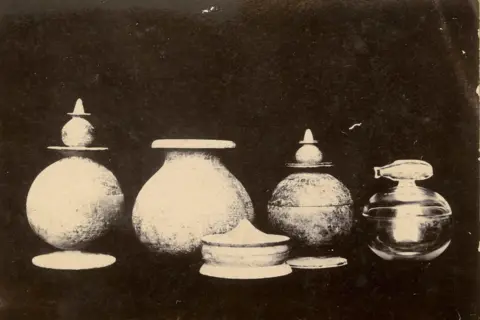
Four containers made of steatite (a type of stone) and one made of rock crystal were found inside a sandstone box at the Piprahwa stupa
Some scholars argue Buddha relics should never be treated as market commodities.
"The Sotheby's auction transforms these highly sacred materials into saleable objects, in continuation of acts of colonial violence which extracted them from a stupa and called them 'gems' and 'objects of interest to Europeans', creating a false division with the ash and bone fragments they were consecrated with," say Thompson and Cheong.
Chris Peppé told the BBC that in all the monasteries he had visited "no Buddhists regard these as corporeal relics".
"A few Buddhist academics at western universities have recently offered a convoluted, fact-defying logic whereby they may be regarded as such. It's an academic construct that is not shared by Buddhists in general who are familiar with the details of the find," he said.
Peppé said the family "looked into donation [of the relics] to temples and museums and they all presented different problems on closer scrutiny".
"An auction seems the fairest and most transparent way to transfer these relics to Buddhists and we are confident that Sotheby's will achieve that."
Some also point to The Koh-i-Noor, seized by the British East India Company and now part of the Crown Jewels, with many Indians viewing it as stolen. Should the Buddha's jewels be next?
"Repatriation, I believe, is seldom necessary," says Ahuja. "Such rare and sacred relics that are unique and which define a land's cultural history, however, deserve the government's exceptional attention."
Israel’s blockade on Gaza starving 290,000 children to death
Israel’s blockade on Gaza starving 290,000 children to death
- More than 3,500 children below the age of five in Gaza face “imminent death by starvation”, and about 290,000 others are “on the brink of death” as Israel continues to prevent the entry of baby formula, nutritional supplements, and all forms of humanitarian aid, according to Gaza’s Government Media Office.
- Mahmoud Alsaqqa, Oxfam’s food security lead in the Gaza Strip, tells Al Jazeera that “the whole world, unfortunately, is contributing to or participating in starving the children in Gaza” by not taking any action against the blockade that started more than two months ago.
- At least 40 Palestinians have been killed and 125 wounded in Israeli attacks across Gaza in the past 24 hours, according to the enclave’s Health Ministry.
- A missile launched from Yemen towards Israel has hit the perimeter of Ben Gurion airport; footage shared on social media shows a plume of smoke visible from a passenger terminal.
- Israel’s war on Gaza has killed at least 52,535 Palestinians and wounded 118,491, according to Gaza’s Health Ministry. The Government Media Office updated the death toll to more than 61,700, saying thousands of people missing under the rubble are presumed dead.
- 11m ago(10:15 GMT)
Gaza’s hospitals to run out of fuel in three days: Health Ministry
Gaza’s Health Ministry has issued an urgent appeal for fuel, warning that hospitals are on the brink of running out.
While some fuel is stored at designated sites, the ministry says aid groups are unable to access or transport it because Israel has declared those areas off-limits.
If no new fuel arrives, hospitals will run out within three days and may be forced to shut down, the ministry added.

Palestinian kidney patients receive dialysis at Al-Aqsa Martyrs Hospital in Deir el-Balah, Gaza, on March 15, 2025 [Moiz Salhi/Anadolu] - 17m ago(10:08 GMT)
Gaza death toll rises
At least 40 Palestinians have been killed and 125 wounded in Israeli attacks across Gaza in the past 24 hours, according to the enclave’s Health Ministry.
Israel’s war on Gaza has killed 52,535 people and wounded 118,491 others since October 7, 2023, it said.
Since Israel ended the ceasefire unilaterally on March 18, it has killed at least 2,436 people in Gaza and wounded 6,450 others, the statement added.
- 21m ago(10:05 GMT)
Israeli military claims dozens of weekend attacks across Gaza
The air force struck more than 100 “terror targets throughout the Gaza Strip” over the past weekend, the Israeli military has claimed in a report.
The targets included tunnels, underground infrastructure sites, and military structures, it said, adding that Israeli troops operating in northern Gaza have “located and dismantled” infrastructure belonging to Hamas both above and below ground.
“In southern Gaza, the troops continue operational activity in Rafah and along the ‘Morag’ corridor,” the report says.
The military has also said, during their activity, the troops “located and dismantled” Hamas weapons, and “struck infrastructure from both the air and ground”.
As we have reported, residential buildings and tents for displaced people are the main targets of Israeli attacks across Gaza. In Khan Younis alone, three children were among 11 killed civilians after Israel bombed the al-Bayram family home overnight on Saturday.

02:02 By approving plans to expand operations in Gaza, Israel is ‘upping the ante’ - 31m ago(09:55 GMT)
Israel killed 13 Palestinians in Gaza since dawn: Report
Israeli attacks have killed 13 people, mostly women and children, across Gaza today, Wafa reports, citing medical sources.
The majority of the victims were killed in an attack on a tent camp in al-Mawasi, near the southern city of Khan Younis, the report said.
Other deadly attacks took place in Khan Younis, Nuseirat and Beit Hanoon, Wafa said.
